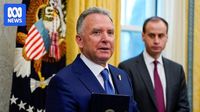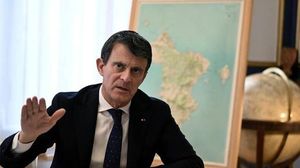In a recent interview, Donald Trump’s special envoy Steve Witkoff dismissed UK Prime Minister Keir Starmer’s proposed peacekeeping plan for Ukraine, branding it as overly simplistic and lacking a foundational security guarantee from the United States. This assessment comes as Starmer's initiative, which has gathered support from more than 30 countries aiming to deter Russia, faces significant skepticism from Trump's administration.
According to reports, Starmer has framed this coalition as essential to promote peace in Ukraine, but Witkoff’s critique of the proposal was sharp. He described it as a "posture," "a pose," and asserted that it reflects a misunderstanding of the current geopolitical realities. Witkoff emphasized that such perceptions are reminiscent of dramatic historical narratives, stating, "There is this sort of notion that we have all got to be like [British wartime prime minister] Winston Churchill," while he labeled this perspective as "preposterous" in the current context.
Notably, the US administration has withstood pressure to offer a security guarantee for the UK plan, which Witkoff addressed during his conversation with Tucker Carlson, echoing sentiments that a more nuanced approach is necessary. He detailed the complexities surrounding Russia’s territorial claims, arguing that a decree exists within the Russian psyche that regards Ukraine as a conglomerate of regions undeserving of its sovereignty, sharing, "There’s a sensibility in Russia that Ukraine is just a false country."
Witkoff, who met Vladimir Putin shortly before his statements, further remarked on the annexed regions in Ukraine. Stating that the sovereignty of these locations is one of the more contentious issues heading into peace talks, he appeared to falter when asked about them, saying, "The largest issue in that conflict are these so-called four regions, Donbas, Crimea, you know the names and there are two others." Factually, however, Russia has annexed five regions: Luhansk, Donetsk, Zaporizhzhia, Kherson, and Crimea, illustrating a gap in Witkoff's understanding of the ongoing conflict.
Despite his criticism of the UK’s plan, Witkoff claimed that a ceasefire in the Black Sea could arrive imminently. He asserted, “We are not far away” from realizing a temporary truce that could last for a full 30 days. However, the nuances of these negotiations remain fraught, particularly as Putin has publicly stated that he anticipates a slow and challenging path ahead.
Meanwhile, Russia's imperial ambitions are often discussed within the framework of historical claims. Witkoff suggested that these territories, some of which have historical connections, likely contribute to a broader Russian strategy not to further engage in wars beyond Ukraine. "They don’t need to absorb Ukraine… They have reclaimed these five regions. They have Crimea and they have got what they want. So why do they need more?" he questioned.
Amid these unfolding events, UK Chancellor Rachel Reeves reacted to Witkoff’s remarks, indicating that Starmer’s diplomatic efforts have not gone unnoticed. She stated, "We want to see a just and lasting peace," pointing to Starmer’s initiative in rallying not just European leaders but also those from beyond the continent in continuous dialogues about the conflict. This effectively represents a call to action from the UK, asserting its role in fostering international consensus for peace.
On March 24, 2025, US diplomats are scheduled to meet with Ukrainian officials and then their Russian counterparts in further negotiations aiming to establish a ceasefire. As Witkoff downplayed fears of Russian expansionism, many observers remain wary about the Kremlin's intentions, particularly as Witkoff's assurances have not been followed by concrete actions to substantiate them.
The ongoing conflict in Ukraine continues to raise complex questions about sovereignty, territorial rights, and the nature of international partnerships in conflict resolution. While Starmer’s vision and Witkoff’s critique present two sides of a contentious issue, it is clear that the path to peace will require substantial negotiation and a reconsideration of old narratives.





